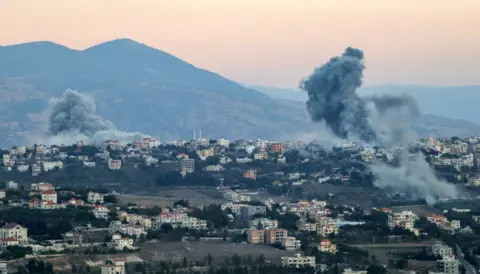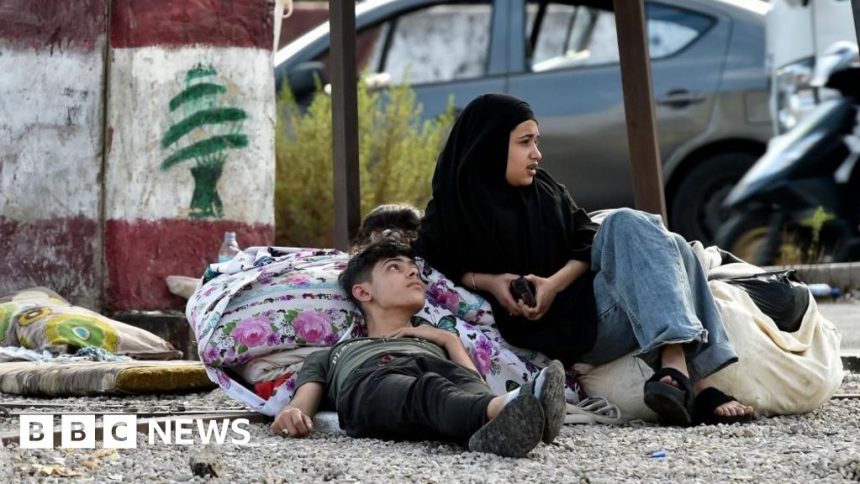‘The country is lost’: Fear and uncertainty in Lebanon as Israel invades
 Getty Images
Getty ImagesFor the past few days, there was a feeling in Lebanon that an Israeli ground invasion into the country’s south was almost inevitable as Israel indicated its campaign against Hezbollah would not stop with the killing of Hassan Nasrallah, who, for three decades, was the face of the group.
Now that this has been confirmed, with what the Israeli military describes as a “limited, localised and targeted” operation, the fear is that this could be the start of something wider.
History shows that it is easy for Israeli troops to enter Lebanon, but difficult for them to leave.
“The country is lost,” a Lebanese friend texted me. Another one wrote: “If you ask me what’s coming, my answer is it will be very long and hard days are coming”. A third said: “We just need to hope for the best.”
There is a feeling that history is repeating itself, and uncertainty about what happens next.
It remains unclear whether Hezbollah can still organise any significant and co-ordinated response. It continues to fire rockets at Israel, but not at the same intensity.
Meanwhile, this is a country under pressure, struggling with the sheer number of casualties from Israeli air strikes and one million people who have already been displaced.
Hezbollah, a Shia Muslim group armed and financed by Iran, is considered a terrorist organisation by the UK, the US and others, but is more than just a militia in Lebanon. It is also a political party with representation in parliament, and a social movement, engrained in Lebanese society, with significant support.
Powerful and influential, Hezbollah, which means Party of God, is often described as a state within a state in Lebanon. It has been weakened by two weeks of unrelenting Israeli air strikes and high-profile assassinations, but has not been defeated.
In a defiant speech on Monday, the Hezbollah number two, Naim Qassem, said its fighters were ready to resist any Israeli invasion. Before this latest escalation, Hezbollah’s armed wing, which includes a vast arsenal of weapons and thousands of battled-hardened fighters, was said to be stronger than the Lebanese army, and the country’s authorities have little say – if any – over the group’s actions.
For almost a year, as Hezbollah carried out near-daily cross-border attacks on Israel, many outside its support base in Lebanon feared that this country, already struggling to recover from years of successive crises, was being dragged into a conflict that it has not chosen to fight.
The economy has essentially collapsed, and political impasse means the country has been without a president for almost two years.
Here, there are still memories of the last war between Israel and Hezbollah, in 2006, when parts of southern Lebanon and Dahieh, the group’s base in Beirut’s southern suburbs, were flattened.
Hezbollah’s rivals will not be disappointed to see a weakened group who, many say, is interested in defending its own interests – and those of its main supporter, Iran.
Hezbollah is the most powerful group in the so-called Axis of Resistance, an alliance of factions across the Middle East supported by Iran that also includes the Houthis in Yemen and militias in Iraq and Syria.
Having a strong Hezbollah in Lebanon, right next to Israel, has always been vital for Iran, part of its deterrence against any Israeli attack on its nuclear facilities.
Yesterday, outside a building in central Beirut hit by an Israeli strike, a resident told me: “I’m against Israel, who is killing us, but I’m against Iran, who is killing us as well”.
This is, obviously, rejected by Hezbollah supporters. “We shed tears of blood over the [Israeli] strike against Nasrallah, may God grant him paradise… He’s irreplaceable,” one of them said, after being forced to flee Dahieh. “We don’t fear [Israel]. We’re still standing.”






